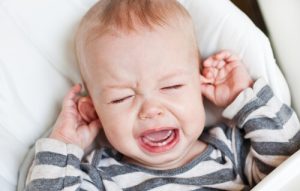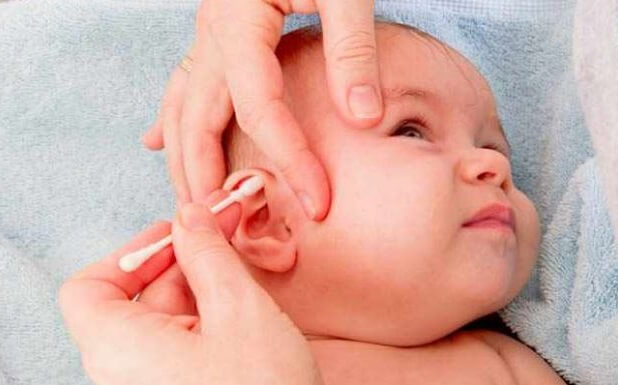How to Avoid Ear Infections in Babies

Ear infections are extremely common in early childhood. In this article, we’ll take a look at some basic precautions to avoid ear infections in babies.
Earaches are probably one of the most acute and painful sensations in the human body. It is also the main symptom of otitis, otherwise known as an ear infection.
What is an ear infection?
First of all, we should clarify that otitis refers to an infection caused by microorganisms in any part of the ear. This causes inflammation, which leads to intense pain.
There are two kinds of otitis:
- Otitis media, or a middle ear infection: affects the ear canal behind the eardrum. This type of ear infection can also affect the Eustachian tube and mastoid bone. It’s very common during early infancy and generally caused by contagious infections. So, going to a nursery can be a risk factor, as well as temperature changes and exposure to tobacco smoke.
- Otitis externa: this type of otitis is caused by inflammation in the outer ear canal. It’s generally caused when water enters the ear, giving this condition its nickname: “swimmer’s ear.” Otitis externa can also be caused by localized trauma, such as jamming a cotton swab too far inside the ear.
Symptoms
The most obvious symptom is earache. This can be accompanied by blocked ears, itching or even oozing earwax.
Other symptoms that may occur are:
- General feeling of malaise
- Fever
- Vomiting
- Secretion of liquid in the ear
- Frequent irritability and inconsolable crying in young children. This can also lead to loss of appetite.
Consequences of otitis
In general, ear infections are a minor illness that can be cured completely without any lasting consequences.
Common treatments include antibiotics and anti-inflammatory medication. These should only be bought and used under prescription from a healthcare professional.
The most obvious symptom is earache. This can be accompanied by blocked ears, itching or even oozing earwax.
In extreme cases, ear infections and inflammations can cause lasting effects. The least severe of these may be a chronic infection or inflammation that keeps coming back.
Ear infections in early childhood can also make children more prone to sensorineural hearing loss later on in life. The likelihood of this depends on how badly the mucous membranes and ossicles are affected, and whether the ear drum has been perforated.
Tips for avoiding ear infections in babies
As mentioned above, otitis is extremely common in babies. According to the Spanish Association of Pediatrics, between 80% and 90% of children will suffer from an ear infection during their first two years of life.
These tips may help to avoid a painful and uncomfortable ear infection:
- Doctors recommend breastfeeding for at least the first six months. Breast milk is the best source of immune defense for your baby’s body. Breastfeeding will therefore help to protect your baby against infections like otitis and others.
- Removing mucous. This tip is almost as important as the first. Teach your child to blow their nose to stop them from breathing in mucous. A build-up of mucous in the nasal and inner-ear passages can contribute to otitis.
“Between 80% and 90% of children will suffer from an ear infection during their first two years of life”
Although less important than the advice above, these preventative measures may also help to prevent ear infections:
- Take care with cotton swabs when you clean your baby’s ears. Strange though it may seem, remember that earwax is there to protect the ear. In fact, many healthcare professionals recommend not using cotton swabs in your baby’s ears at all, at least during the first two years of life.
- Tip your baby’s head while you bathe them to avoid water getting into their ears. This is one of the main causes of otitis in both adults and children.
- Avoid hot, humid environments and keep your child away from smoky places.
- Visit a specialist for an ear exam as soon as you see that your baby is in pain.

Unfortunately, there is no failsafe way to protect your child against ear infections. Make sure to pay attention to the symptoms of otitis so you’ll be able to take action as soon as possible.
If an ear infection is uncomfortable for adults, who can talk about the pain and take medication to control it, just imagine how intense and painful it can be for a baby, who has no way to express what they’re feeling.
With all this in mind, keep a watchful eye on your baby. By keeping all of the tips above in mind, you’ll be able to reduce the risk of this common and unpleasant childhood illness.
Ear infections are extremely common in early childhood. In this article, we’ll take a look at some basic precautions to avoid ear infections in babies.
Earaches are probably one of the most acute and painful sensations in the human body. It is also the main symptom of otitis, otherwise known as an ear infection.
What is an ear infection?
First of all, we should clarify that otitis refers to an infection caused by microorganisms in any part of the ear. This causes inflammation, which leads to intense pain.
There are two kinds of otitis:
- Otitis media, or a middle ear infection: affects the ear canal behind the eardrum. This type of ear infection can also affect the Eustachian tube and mastoid bone. It’s very common during early infancy and generally caused by contagious infections. So, going to a nursery can be a risk factor, as well as temperature changes and exposure to tobacco smoke.
- Otitis externa: this type of otitis is caused by inflammation in the outer ear canal. It’s generally caused when water enters the ear, giving this condition its nickname: “swimmer’s ear.” Otitis externa can also be caused by localized trauma, such as jamming a cotton swab too far inside the ear.
Symptoms
The most obvious symptom is earache. This can be accompanied by blocked ears, itching or even oozing earwax.
Other symptoms that may occur are:
- General feeling of malaise
- Fever
- Vomiting
- Secretion of liquid in the ear
- Frequent irritability and inconsolable crying in young children. This can also lead to loss of appetite.
Consequences of otitis
In general, ear infections are a minor illness that can be cured completely without any lasting consequences.
Common treatments include antibiotics and anti-inflammatory medication. These should only be bought and used under prescription from a healthcare professional.
The most obvious symptom is earache. This can be accompanied by blocked ears, itching or even oozing earwax.
In extreme cases, ear infections and inflammations can cause lasting effects. The least severe of these may be a chronic infection or inflammation that keeps coming back.
Ear infections in early childhood can also make children more prone to sensorineural hearing loss later on in life. The likelihood of this depends on how badly the mucous membranes and ossicles are affected, and whether the ear drum has been perforated.
Tips for avoiding ear infections in babies
As mentioned above, otitis is extremely common in babies. According to the Spanish Association of Pediatrics, between 80% and 90% of children will suffer from an ear infection during their first two years of life.
These tips may help to avoid a painful and uncomfortable ear infection:
- Doctors recommend breastfeeding for at least the first six months. Breast milk is the best source of immune defense for your baby’s body. Breastfeeding will therefore help to protect your baby against infections like otitis and others.
- Removing mucous. This tip is almost as important as the first. Teach your child to blow their nose to stop them from breathing in mucous. A build-up of mucous in the nasal and inner-ear passages can contribute to otitis.
“Between 80% and 90% of children will suffer from an ear infection during their first two years of life”
Although less important than the advice above, these preventative measures may also help to prevent ear infections:
- Take care with cotton swabs when you clean your baby’s ears. Strange though it may seem, remember that earwax is there to protect the ear. In fact, many healthcare professionals recommend not using cotton swabs in your baby’s ears at all, at least during the first two years of life.
- Tip your baby’s head while you bathe them to avoid water getting into their ears. This is one of the main causes of otitis in both adults and children.
- Avoid hot, humid environments and keep your child away from smoky places.
- Visit a specialist for an ear exam as soon as you see that your baby is in pain.

Unfortunately, there is no failsafe way to protect your child against ear infections. Make sure to pay attention to the symptoms of otitis so you’ll be able to take action as soon as possible.
If an ear infection is uncomfortable for adults, who can talk about the pain and take medication to control it, just imagine how intense and painful it can be for a baby, who has no way to express what they’re feeling.
With all this in mind, keep a watchful eye on your baby. By keeping all of the tips above in mind, you’ll be able to reduce the risk of this common and unpleasant childhood illness.
This text is provided for informational purposes only and does not replace consultation with a professional. If in doubt, consult your specialist.








